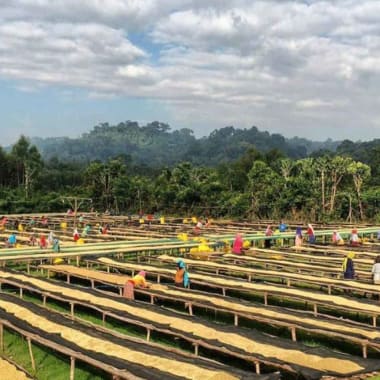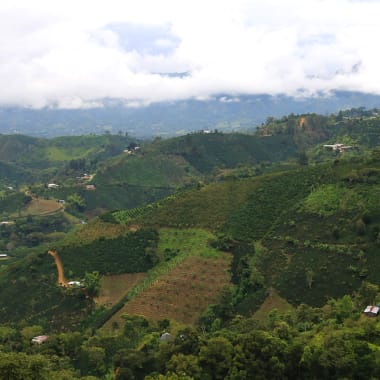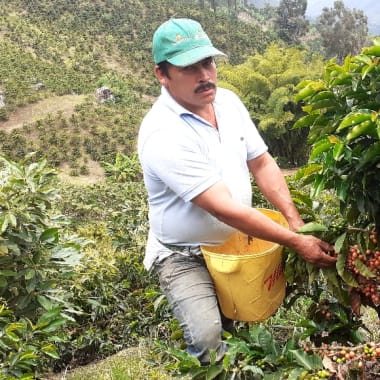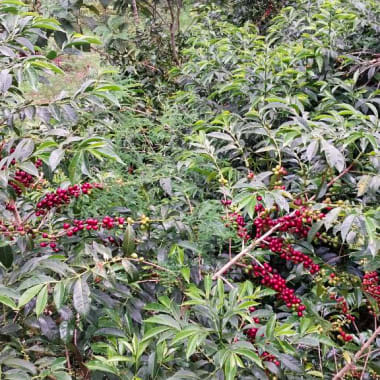Ecuador
Grace Morales
Grace employs natural and washed processes in coffee production. She believes in offering many profiles to cater to various tastes. In this lot, we’re getting red apple, grape, and honey.
50 years ago, there were no streets or roads leading to this farm. People could only access the area by walking or on a horse. There were two routes, which still exist today, crossing the summit and forming a cross visible from afar; this is how Grace’s grandfather named the farm. Even when Grace’s father took over, there were still no suitable roads for transporting heavy goods. He aimed to mechanize various processes on his land but faced difficulty in transporting the required machinery. He began studying mechanics and eventually had the machines brought up in small pieces, then reassembled them on the farm. Thanks to his dedication, this farm became the first in the region to have some mechanized processes.
The farm sits amidst virgin jungle, harboring a diverse array of species that can be observed while wandering across the land. Although coffee is the primary crop, it occupies less than 2% of the farm’s total area. The rest of the 350-hectare land is dedicated to growing various other fruits and vegetables for sale and export. It holds special significance for the extended family, serving as a hub for gatherings and holidays. Today, Grace employs natural and washed processes in coffee production. She believes in offering different profiles to cater to various tastes, reflecting her passion for high-quality food products and the desire to provide something truly exceptional. Working primarily with her brother, the entire family comes together to lend a helping hand whenever needed.
Grace and Bryan are relatively new to coffee production, having planted their trees merely three years ago. After eagerly awaiting their first proper harvest, they are now excited to embark on their coffee journey. Grace’s dedication to her craft and her desire to offer exceptional products reflect the family’s legacy on this farm. As they continue to expand and innovate, the farm stands as a testament to the hard work and passion that have shaped it over the decades, remaining a cherished place for generations to come.
Sourcing and ingredients
100% Caturra coffee beans, roasted by us on Gadigal land / Sydney.
Country grade: Unknown ?
Packaging
Bag: ABA Certified home compostable
Label: Recyclable
Valve (on bags larger than 250g): General waste
Coffee ordered online is shipped in a recyclable cardboard box
Brewing this coffee
We recommend brewing this coffee 15–49 days post-roast. If pre-ground, brew as soon as possible. Our advice on storing coffee.
1:3
dose:yield
ratio
To brew on espresso, we recommend using 20g of beans (dose) to get 60g of espresso out (yield), during 24-28 seconds.
1:16.7
beans:water
ratio
To brew in infusion/fed brewers (V60, Chemex) use a ratio of 1:16.7 ratio of beans:water.
1:14.3
beans:water
ratio
To brew in immersion brewers (plunger, AeroPress, Kalita, batch brewer) we recommend using a 1:14.3 ratio of beans:water
1:12
beans:water
ratio
To brew as cold brew we recommend using a 1:12 ratio of beans:water
Varietals
Caturra varietal
Caturra is a natural mutation of Bourbon that was originally discovered in Brazil in 1937, considered to be the first naturally occurring mutation ever discovered.
The location
Coffee from Ecuador
For a long time most of Ecuador’s coffee production was for commodity grade export or the production of soluble coffees (freeze dried coffee). Only in the last few years has the potential of the country’s coffee production been really explored. We’re very excited about the potential Ecuador and have some truly exceptional coffees
Farm processes
Honey process
This technique leaves some flesh on the coffee cherry as it is washed and dried. This tends to give a slightly sweeter flavour, but can also reduce the quality and longevity of the coffee due to the fermentation of the sugars in the flesh.

Subscribe to a world of coffee
Discover a new single origin coffee from Sample every 1-5 weeks with no delivery fees.
No up-front purchase, and you can pause, cancel, or change plans at any time.
Available to order online this week:

Ethiopia Kecho Anderacha
Flavours of candied lemon, white peach, bergamot
Body Acidity
Washed Ethiopian Heirloom
November 2023 harvest
Roasted omni for filter and espresso
Ethiopia Kecho Anderacha online
Colombia La Serrania Decaf
Flavours of honey and blackberry
Body Acidity
Washed + EA Natural Decaf Caturra, Castillo, V.Colombia
Roasted omni for filter and espresso
Colombia La Serrania Decaf online
Colombia Faver Emir Ninco
Flavours of cola, cherry, blood orange
Body Acidity
Washed Pink Bourbon
March 2024 harvest
Roasted omni for filter and espresso
Colombia Faver Emir Ninco online
Ethiopia Bekele Gemeda
Flavours of orange marmalade, peach, apricot
Body Acidity
Washed Ethiopian Heirloom
January 2024 harvest
Roasted omni for filter and espresso
Ethiopia Bekele Gemeda online